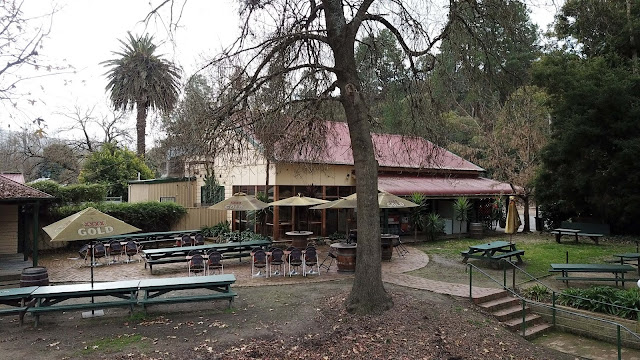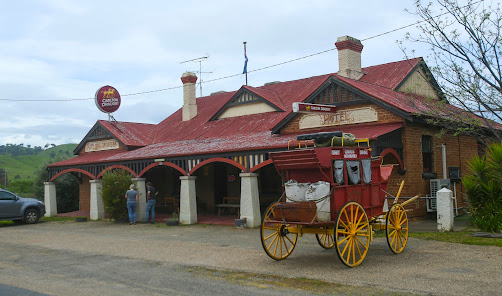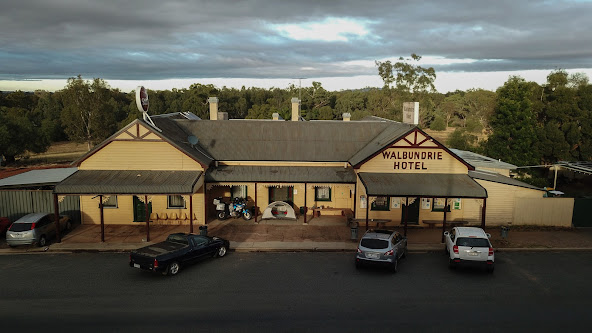The Bridge Hotel at Jingellic, haunt of Rex, one of the more memorable people on the river.
A tricky right turn off the Murray River road and I’m on the
new(ish) bridge crossing the Murray back into NSW and then off to the right is
the Jingellic General Store with a couple of blokes in work gear heading out,
mitts full of pastry and iced coffees.
Inside Kylie’s looking after the joint and I figure another
brew’s in order and then I ask about the bloke a fella back in Walwa just told
me I must see.
“Ah, Rexy!” you’ve not
long missed him. Was down here to pick up his morning paper and sandwich but
he’s just walked back up to his house.”
She comes outside and points up the hill. “That’s his place, he’ll probably be out on
the veranda reading the paper in the sunshine like he always does.”
Then I ask about the way to Lankey’s Creek and it’s straight
on past Rex’s and then a left at the Holbrook road and then the fatal words, ‘you can’t miss it.’
I’m running early so I take my time then thank Kylie, and
ride up to the place on the hill where, true to word, an old bloke is hunched
on his verandah reading the paper – with a magnifying glass.
Rex Beaver welcomes me like an old mate, as though I’m some
prodigal son he’s not seen for way too long, and invites me, instructs me, to
take the weight off my feet.
I tell him why I’m hanging around and how I’d like to have a
yarn with him down at the pub and he’d be only too happy. And could he drive
down there, please?
He laughs – he obviously laughs a lot – and stabs a finger
in my general direction, “so you’ve heard
about my machine have you?”
I tell him I have and wonder if we could do it in a couple
of hours after I’ve been up to the old wine shanty and again he laughs, tells
me it’s all very easy and when I seek confirmation of the directions he
duplicates Kylie’s but adds:
“Just keep going and
you’ll see the shanty up on your left and maybe some camels but,” and here
he adds the bit that always seems to be tagged onto instructions that men,
especially men give in the bush, especially the bush: “if you get to the railway cars on the right you’ve gone too far.”
I can’t remember the last time someone in the country who’s
given me directions hasn’t added on the ‘then
you’ve gone too far’ clause.
I leave Rex to his paper and his magnifying glass and head
north.
-
- - - - - - -
A couple of hours later and I'm coasting back down the hill from
another adventure at the old wine shanty, I glance up at Rex’s place and in the
open carport a figure is whipping on the starter cord of an unseen engine which
doesn't want to fire up.
I watch the silhouette ripping the cord out in a motion
similar to a cross-cut saw then rewinding it on the wheel and ripping it again
without any engine coughing into life.
If that's old Rex I feel a bit guilty about my earlier request, and then I roll down, knowing I’ve beaten my quarry to the pub. I grab a quick beer and head out the front to
what has to be one of the greatest beer gardens on the entire Murray River.
Off to the left are the remaining piles of the original
Jingellic Bridge, straight out front is just the best swimming hole in this
part of the river and to the right, the pebbled elbow behind a couple of
caravans.
No-one who’s visited Jingellic doesn't love this place –
doesn't list it amongst their favourite spots. I’ve had some of my most
refreshing river swims here, and woken to some of my most exquisite riverside
mornings.
My jar’s soon drought-affected so I head back in, grab
another from Peter and pretty soon Rex chugs into view.
(Now I just have to put in this aside: There's a bucket full of history surrounding Jingellic and the Bridge Hotel - things like the picnic massacre of 1924 and the stories
I was about to spend a hour or so with one such bloke.)
Back up at his place Rex’d explained a few things. About a
year back his
And since he lives just a bit beyond walking from the pub,
this man without a bicycle and without a licence had a dilemma. But then he had a flash, went to the local
council and made them an offer: If they didn't have a problem with him piloting
his ride-on mower along what passes for the footpaths between his place and
town, when the grass needed cutting, he’d make the journey with the blades
down.
As he put it: “Winner
winner chicken dinner!”
It was his mower that Rex was trying to start as I rolled
down the pub
and it’s the same red beast that sails past thepub’s window and into a parking spot beside my bike.
You know those people you see in pubs, in groups, leading
the discussion, causing the laughter, being the magnet, the glue, the source of
endless and enduring good cheer? Well I know immediately that Rex is one of
them.
I splash out on a water for him and settle back for the fun.
Going to school, Rex Beaver had always been fascinated with
Australia and in 1953 in an old cinema in his home town of Leicester in the
English midlands he watched “The Overlanders” with Chips Rafferty.
The 15 year old told his mum and she said someone from down
the street had gone to Australia and she’d have a chat with them and ask them
about it.
“She found out and it
was the Big Brotherhood movement and I had to go with mum and dad to London to
have an interview and everything was right just like that and within 5 months I
was on the Himalaya. I remember the date, it was the third of March, 1954.
The rules were that
they wouldn't let our parents see us off at the boat. We said our goodbyes at
the railway station because they said it was too hard to say goodbye at the
bloody boat and the neighbours saw me off.”
When the ship docked in Sydney a representative of the Big
Brotherhood introduced Rex and a few other lads to a gentleman, “who said he was taking us to a training
farm out near Auburn on the Parramatta River to teach us how to milk cows. We
were there for about a fortnight. Well it didn't take much for me to learn how
to milk a cow. I had it worked out by the second day.”
When the two weeks were up, Rex was taken back to Auburn
station with one ticket to Central Railway and another to Albury.
“When I got to Albury this bloke walked up to me and said, ‘are you Rex Beaver?’ and I said, ‘yeah’ and he said he was George Palmer
and he took me out to Dora Dora, well, Talmalmo and the next morning told me to
go have a look around. So I did and I went back to him and said, ‘this is probably the most beautiful place
I’ve ever seen.’ I just instantly loved it.
“This farm was only
about 50 yards from the river, it was magnificent and we only had about 30 cows
that I had to milk each day. We got paid a tiny bit but at stage it was really
just an adventure.” Rex was still
only 16.
On the trip on the Himalaya, Rex’d made a few mates and one
of them, Bill Shaw had been sent to another farm not too far away and they
palled up again. Despite loving the location and enjoying the work, Rex was
lonely and looking for a bit of a change.
“Mr Palmer and his
wife had no kids so I was pretty much on my own there and was missing young
company. I went to another couple of farms and then a bloke named Eddie
Coleman, he came up to me and my mate Bill Shaw from the ship and he said, ‘how’d
you both like to come fencin’ for us?’ And I said, ‘yeah!’
I had no idea what
fencing was but I learnt fast and loved it but my mate couldn't handle it.
It was hard work. We’d
axe down the stringybark and cross cut saw them into shape, put a little point
on ‘em and make a bit of a hole with a crow bar and drive ‘em in with this
massive maul.
Then we’d connect the
ringlock wires and make the fences.
Sheep fences. This
bloke had bush leases and he had thousands, not a thousand but thousands of
acres. And they went from the riverside a few thousand feet up and right over
the ridge.
I loved this. We were
camping out in the bush at night, cooking our own food and then working like
buggery all day.”
Once the fences were all done, Eddie Coleman had Rex muster
his sheep and then the boss taught the 10 quid pom to shear them. “I thought I loved the other jobs but
shearing was my calling, I really loved the shearing from the very start.”
Rex married in the early 1960’s and welcomed children into
his family in 1963, ’65, ’67, ’69 and 1974 but in June 1979 his wife, newly
converted to be a Jehovah’s Witness, left him and took all five children.
“Well I hadn’t made a
family of beautiful kids so I could live alone so I started fighting and by
October that year I had custody of them all. The youngest was 5 and the oldest
was 16.”
They were all crammed into a place at Walwa but in 1982
Rex’s endless positivity and good humour came in trumps.
“I was shearing for a
bloke over at Holbrook, and he said, ‘if you ever find a decent old shed that I
can take down and reassemble where I need it, let me know.’ Anyway a bit later
I realized there’s one up at Jingellic and it used to be an old super dump
about
100 foot long with a massive strong roof. So I rang him and said, ‘Reece
there’s a shed here for ya,’ and I gave him the details.
Well a few weeks later
he rings me and says, ‘I bought that shed but I’ll tell ya what I’ll do for ya.
You help me take it apart and I’ll give you the block of land it’s on.’ So I
helped him pull it down and he said, ‘Rex, you’ve shorn thousands of sheep for
me sometimes in very tough times and you never once complained.’ So he signed
the place over to me and we all had a new home!
He never got on with a
lot of shearers and contractors but I got on fine with him.”
Then the old house burnt down. Rex was in bed but luckily
the kids were awake and they raced into his bedroom screaming and they all got
out but the place was destroyed. They
were homeless.
“Lucky it was insured,
this was in 1993 and the arson people came and checked it out and they found an
electrical fault inside one of the walls caused it and we got this place out of
it.”
In 2002, Rex bought 100 acres of the farm where he’d first
tugged on cow teats more than half a century earlier. His land extends from the
roadside up to past the top of the range. He doesn't run cattle and doesn't
grow crops. It’s just part of his home and from the top he can view the entire
valley and the serpentine upper Murray.
Since the day he arrived here, Rex’s lived every single day
as he says, with the certain belief that he is occupying a piece of heaven,
that his life is blessed.
Like Peter Sutherland, Rex wants to be buried on his plot up
in the hills but he wants no eulogy saying he’s in paradise, “because I’ll have just left it!”
And he’s in no
rush: “If I could call god and have a
word, I’d ask him to leave me here for another 190 years.”
I suggest he should also ask for a mower with electric start
and he just laughs and tells me that a bit of toil’s never hurt any man.
I look at this hands and know that’s been one of his mantras
all his life.














Comments
Post a Comment